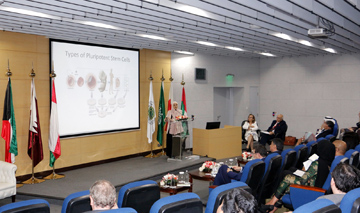ID :
491484
Tue, 05/08/2018 - 20:14
Auther :
Shortlink :
https://www.oananews.org//node/491484
The shortlink copeid
AGU concludes Stem Cell Conference

Manama, May 8 (BNA): Director of the Stem Cell Unit at Princess Al-Jawhara Centre at Arabian Gulf University (AGU) Dr Safuq Al-Shammari asserted that there is a global agreement that stem cells are the future of medicine. Despite most stem cell treatments being experiments yet unapproved for all organs of the body, it is one of the most effective and least expensive treatments.
Dr Al-Shammari, who is also Director of Global Health Affairs at the University of Osaka, Japan, said that stem cell therapy has achieved proven breakthrough in certain areas, such as a kidney failure or myocardial insufficiency, which was an intractable disease due to the scarcity of heart donors. In Japan, stem cell therapy has been applied to patients with cardiomyopathy under insurance coverage, making it accessible to all.
Dr Al-Shammari's speech came during his participation in the Ethics and Regulations of Stem Cell Clinical Research Conference, which concluded on Sunday at AGU, under the patronage of the President of the Supreme Council of Health, jointly organised by the National Health Regulatory Authority, AGU and RCSI - Medical University of Bahrain.
There are countries and institutions that trade in stem cells without qualifications, to which patients resort because they are cheaper. Patients have to choose wisely and recourse to an internationally recognised authority to ensure the effectiveness of treatment. This can be confirmed by reviewing the website of the International Stem Cell Society, which presents a list of certified hospitals and medical centres in the field of stem cell therapy.
Dr Adel Medhkour, Director of the Clinical Research Centre at AGU said that the university initiated this conference in cooperation with partners in order to develop a national legislative framework for the usage of stem cell technology and to benefit from international expertise in this field.
The conference reviewed the experiences of many countries in developing ethics and regulations for stem cell treatment such as the USA, the UK, Japan and the Hashemite Kingdom of Jordan.
Dr Al-Shammari explained that it is possible to transfer the experience of stem cell research and treatment followed at Osaka University to the GCC, taking into account the specificity of society in the Gulf. In order to start this process we need to employ qualified human resources, prepare a workplace, and join forces to develop therapeutic techniques using stem cell technology.
For her part, Molecular Cell Biology Specialist Dr Rana Dajani, presented the experience of developing regulatory framework for stem cell research and treatment in Jordan. The work of the National Committee that she was a member of focused on drafting the law to regulate clinical scientific research and stem cell therapy. The committee was comprised of specialists, doctors, sharia scholars and lawyers who discussed the possible challenges, until an agreement was reached for the issuance of the law, which was presented to Parliament and then passed by Royal decree. "Jordan is considered the first Arab Islamic country to issue such a law, which was issued in 2014."





